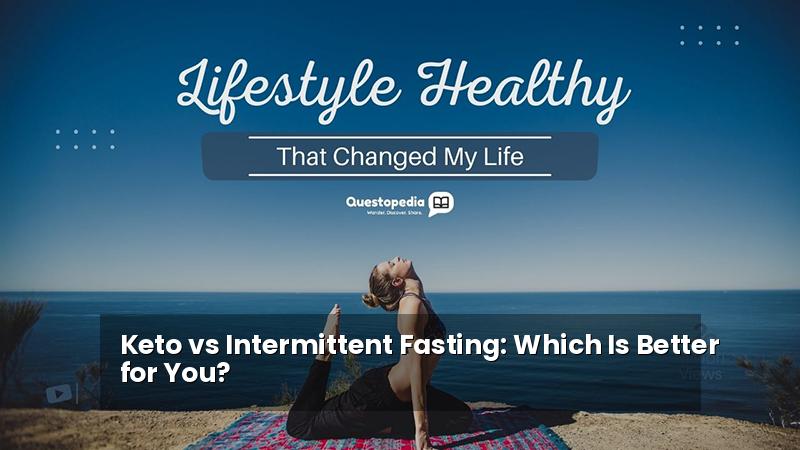Keto vs Intermittent Fasting: Which Is Better for You?
The world of weight loss and health optimization is filled with various strategies, two of the most popular being the ketogenic diet (Keto) and intermittent fasting (IF). Both have gained significant traction for their potential benefits, but understanding their differences and how they might work for you is crucial. This article delves into the specifics of each, exploring their pros, cons, and how to determine which approach is the better fit for your individual needs and goals.
Understanding the Ketogenic Diet (Keto)
The keto diet is a high-fat, very low-carbohydrate, and moderate-protein diet. The goal is to shift your body’s primary fuel source from glucose (from carbohydrates) to ketones (from fat). This metabolic state is called ketosis. By drastically reducing carbohydrate intake, your body is forced to break down stored fat for energy, leading to potential weight loss and other health benefits.
Key Principles of the Keto Diet:
- Macronutrient Ratios: Typically, the keto diet involves consuming around 70-80% of your calories from fat, 20-25% from protein, and only 5-10% from carbohydrates.
- Food Choices: Focus on foods high in healthy fats, such as avocados, nuts, seeds, olive oil, and fatty fish. Limit or eliminate carbohydrate-rich foods like bread, pasta, rice, fruits, and sugary drinks.
- Potential Benefits: Weight loss, improved blood sugar control, reduced seizures in epilepsy (historically its original purpose), and potentially improved cognitive function.
Understanding Intermittent Fasting (IF)
Intermittent fasting isn’t a diet in the traditional sense; it’s more of an eating pattern that cycles between periods of eating and voluntary fasting on a regular schedule. There are several popular IF methods.
Popular Intermittent Fasting Methods:
- 16/8 Method: Fasting for 16 hours each day and restricting your eating window to 8 hours. This is a common and relatively easy-to-follow method.
- 5:2 Diet: Eating normally for five days of the week and restricting calorie intake to 500-600 calories on the other two non-consecutive days.
- Eat-Stop-Eat: Involves fasting for a full 24 hours once or twice per week.
- Alternate-Day Fasting: Eating normally one day and then consuming very few calories (around 500) the next day.
Potential Benefits of Intermittent Fasting:
IF can lead to weight loss by creating a calorie deficit, improving insulin sensitivity, and promoting cellular repair. Studies also suggest it can improve heart health and brain function. For more information on IF, check out this Healthline guide on Intermittent Fasting.
Keto vs. Intermittent Fasting: Key Differences
While both Keto and IF can contribute to weight loss and improved health, their mechanisms of action differ significantly:
- Keto: Focuses on changing *what* you eat by drastically reducing carbohydrates and increasing fat intake. It’s a specific dietary approach.
- IF: Focuses on *when* you eat, cycling between periods of eating and fasting. It’s an eating pattern rather than a specific diet.
You can, however, combine the two! Many people find success by following a ketogenic diet during their eating windows when practicing intermittent fasting. This approach can potentially amplify the benefits of both strategies.
Combining Keto and Intermittent Fasting
Combining these two strategies may lead to a synergistic effect. The keto diet helps deplete glycogen stores, making it easier to enter ketosis during fasting periods. Fasting, in turn, can enhance fat burning and ketone production, potentially accelerating weight loss and improving metabolic health. This method is not without challenges, however. Proper planning and attention to electrolyte balance are crucial to avoid side effects like the “keto flu” or nutrient deficiencies.
Which is Right for You? Factors to Consider
Choosing between Keto and IF depends on several factors:
- Your Goals: Are you primarily focused on weight loss, improved blood sugar, or other health benefits?
- Your Lifestyle: Can you adhere to the strict carbohydrate restrictions of the keto diet? Do you have a schedule that allows for consistent fasting periods?
- Your Health Conditions: Individuals with certain health conditions, such as diabetes, kidney disease, or eating disorders, should consult with a healthcare professional before starting either Keto or IF.
- Your Personal Preferences: Do you prefer to focus on *what* you eat or *when* you eat? Some individuals find one approach more sustainable and enjoyable than the other.
Potential Drawbacks and Considerations
Both Keto and IF have potential drawbacks. The keto diet can be restrictive and may lead to nutrient deficiencies if not properly planned. Common side effects during the initial adaptation phase (the “keto flu”) can include fatigue, headaches, and constipation. Intermittent fasting can be challenging for some people, leading to hunger, irritability, and potential overeating during feeding windows. It’s essential to listen to your body and adjust your approach as needed.
Consulting with a Healthcare Professional
Before making any significant changes to your diet or lifestyle, it’s always recommended to consult with a healthcare professional or registered dietitian. They can help you assess your individual needs, identify any potential risks, and develop a personalized plan that’s safe and effective for you. Remember to also check out other helpful articles on Questopedia.xyz.
Conclusion
Ultimately, the “better” choice between Keto and Intermittent Fasting is highly individual. Both strategies can be effective for weight loss and improving health, but they work through different mechanisms. Consider your goals, lifestyle, and health conditions when making your decision. You may find that one approach is more suitable for you than the other, or that combining the two offers the best results. Regardless of which path you choose, remember that consistency and a balanced approach are key to long-term success. Prioritizing whole, unprocessed foods and mindful eating habits will always be fundamental to a healthy lifestyle.






